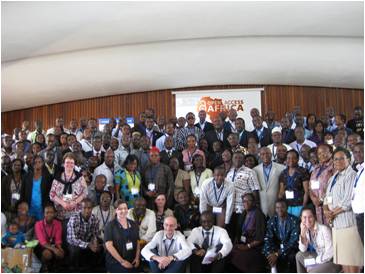 Last week, I returned from Ghana, where BioMed Central and ComputerAid were running the 2nd annual Open
Last week, I returned from Ghana, where BioMed Central and ComputerAid were running the 2nd annual Open
Access Africa conference. The conference was hosted by Kwame Nkrumah University of Science and
Technology (KNUST) and ran like clockwork due to the outstanding efforts of
the University Librarian, Helena Asamoah-Hassan, and her team. Mrs Asamoah-Hassan
is a leader in open access developments in Africa ; KNUST implemented the first
Institutional Repository in
Ghana, was the first Foundation
Member of BioMed Central, and the
Vice Chancellor is in the process of signing the Berlin Declaration. On these merits it was a really
appropriate venue to hold the conference.
I have been to a lot of open access talks over the last
years, and these days rarely hear much that makes me sit up and listen. This
conference was different. Here were a group of exceptionally motivated people,
doing extraordinary things with few resources and showing how open access
really can change lives. It was inspiring. It also raised some questions to
consider.
The need for African based open access journals, and the issues
with funding them, was a theme throughout the conference. African journals
publish research which is relevant to Africa and needs to be accessible to
other African researchers. Lesley Chan from Bioline used the example
of Professor Mary Abukutsa-Onyango’s
research into African indigenous vegetables, as an example of why important research relevant to the continent
needs to be published in open access journals, which can be read and the
results applied in Africa.
There is much support for African journals to be published under
an open access model, but this does raise the question of sustainability. Many open access publishers, such as BioMed
Central, waive
the Article Processing Charge (APC) automatically for researchers in
low-income countries. However, as open access gains momentum in these
countries, this may not remain a sustainable option, so it was interesting to
hear the Vice Dean of the Medical School at KNUST, Yaw Adu-Sarkodie, saying that he would always pay the APC when his work has
the funding to do so even if he was offered a waiver, enabling others who did
not have funding to get published.
Another aspect of this was raised by Raoul Kamadjeu who
founded and runs the Pan African Medical Journal
, an open access journal. Only a couple of years old, it is an outstanding success, having received over 800 submissions
this year alone. However with this success,
it needs urgently to consider how it will fund itself in the future. He
asks “with the international publishers granting waivers to African authors,
how can I persuade them to pay an APC?”.
A conversation needs to continue on these issues.
Institutional Repositories are playing a big part in making
African research open and in raising the visibility of the research in many
universities, and we were presented with interesting views of experiences of
building repositories from Helena Asamoah-Hassan of KNUST and from Irene Ochyancha from the United Nations Economic Commission for
Africa (UNECA). It was especially exciting for us to hear from Pablo de
Castro that the new Institutional Repository
built at the University of Khartoum was a direct result of a meeting held at
the first
Open Access Africa conference.
At this conference, many more relationships were forged and
ideas hatched. New open access groups were formed at the conference for Nigeria
and Ghana. We look forward to hearing next year at Open Access Africa 2012
about the blossoming of open access in Africa, and the new developments which
will doubtless have been born at this conference.
Comments